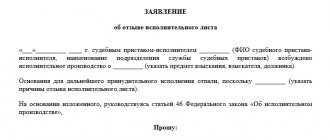Citizens have the right to appeal not only decisions in civil and criminal cases, but also in administrative offenses. Since government officials and courts (both magistrates and district courts) can hold administrative liability, it can be difficult to figure out where and to whom to complain about the decision.
In this article we will tell you how to correctly draw up an appeal against a decision in an administrative case, where to send it and what is the procedure for its consideration.
Cases subject to appeal
It is important to note that it is only possible to appeal a decision that has not yet entered into legal force, i.e. one month has not passed since the decision of the court of first instance. Otherwise, the party should already apply to the cassation authority.
You can appeal the decision either in full or in part (for example, regarding the distribution of legal costs between the parties). During the period of appeal (regardless of whether the court decision is appealed in whole or in part), the court decision does not enter into legal force in accordance with paragraph. 2 clause 2 of the Resolution of the Plenum of the Supreme Court of the Russian Federation “On the application by courts of the norms of civil procedural legislation governing proceedings in the court of appeal.”
The procedure for filing an appeal under the CAS RF
Due to the existing system of judicial system of courts of general jurisdiction, an appeal or presentation can be addressed to different courts, depending on the decision of which court is being appealed. For example, if a decision is made by a district court, then the appeal is considered by the supreme court of the subject (Article 296 of the Caspian Code of the Russian Federation).
In order for an appeal to be considered by the appellate court, it must be filed through the court whose decision is being appealed.
Article 298 of the CAS of the Russian Federation establishes the deadlines for filing an appeal. The general filing period, as stated earlier, is one month, but special deadlines are also established by law. Thus, a complaint against a court decision in a case challenging the law of a constituent entity of the Russian Federation on the dissolution of a representative body of a municipal entity must be filed within 10 days from the date of adoption of such a decision; a complaint against a court decision in a case challenging a normative legal act adopted by an election commission must be filed within 5 days from the date of the decision.
The deadline for filing an appeal can be restored if there is a good reason (Part 2 of Article 302 of the CAS RF). So, when filing an appeal, you can make a request in the text to restore the deadline and indicate the reasons for the absence, as well as attach evidence of the absence (for example, the person was being treated in a hospital, a corresponding certificate from a medical institution will be used as evidence).
What documents should I attach?
In addition to the text itself, the package contains copies of all additional documents that act as evidence of violation of rights.
Documents can be sent by mail or brought to the body that made the decision yourself. When sent by mail, the letter must contain a notification. When submitting, personally put an acceptance stamp on your copy of the document.
Documents that were previously submitted to the first instance do not need to be submitted. Copies of the attachments must be prepared for all parties who will be involved in the review.
Contents and submission of a complaint
The content of an appeal is certainly different from the content of an administrative claim. The main difference is the indication in the complaint of the grounds on which the complainant considers the decision of the court of first instance to be incorrect. Since, according to the meaning of the appeal, it is not the actions of another person that violate our rights and freedoms that are appealed, but a court decision that violates rights and interests by incorrectly resolving the dispute.
When preparing the text of a complaint, it is important not only to point out any violations of substantive or procedural law, but also to justify how exactly such violations entailed a violation of the rights, freedoms and legitimate interests of the applicant himself.
Also, when drawing up an appeal, it is recommended to indicate not just the appellate court, but also the specific structural unit that considers such complaints (for example, the Judicial Collegium for Administrative Cases of the Armed Forces of the Russian Federation).
The appendix to the appeal must necessarily contain the court decision that is being appealed.
The amount of the state fee, the payment receipt of which must also be attached to the complaint, is determined by subparagraph 9 of paragraph 1 of Article 333.19 of the Tax Code of the Russian Federation (hereinafter referred to as the Tax Code of the Russian Federation) and is 50% of the amount of the state fee payable when filing a claim of a non-property nature. According to subparagraph 3 of paragraph 1 of Article 333.19 of the Tax Code of the Russian Federation, the amount of the state duty when filing a claim of a non-property nature is: for individuals - 300 rubles; for organizations - 6 thousand rubles. Thus, when filing an appeal, a state fee must be paid: by an individual - in the amount of 150 rubles, by an organization - 3 thousand rubles. The law allows cases when payment of the duty can be made in installments (deferment) and the amount of the duty can be reduced.
The CAS of the Russian Federation introduced a novelty regarding the sending of procedural documents to other parties to the dispute. If the person filing the complaint does not have state or other public powers, then he may, at his discretion, either independently send the complaint and the documents attached to it to the parties to the case, or send the appeal and the documents attached to it with copies to the court, the number of which corresponds to the number of persons participating in the case.
Sample complaint against a decision on an administrative offense
In Chertanovsky District Court of Moscow 117556, Moscow, st. Artekovskaya, no. 3a through the office of the judicial district of the magistrate No. 230 of the Chertanovo district Central city of Moscow 117570, Moscow, Krasnogo Mayak st., no. 13b
from Vladimir Valerievich Zhelonov, living at the address: 111000, Moscow, st. Shipilovskaya, 60, building 1, apt. 10 tel.: 8-999-333-77-XX
COMPLAINT against the resolution of April 1, 2021 in the case of administrative offense No. 5-333/16
By the resolution of the magistrate of the court district No. 232 of the Chertanovo Northern district of the city of Moscow K. (acting magistrate of the judicial district No. 230 of the Chertanovo Central district of Moscow) dated April 1, 2021 in administrative case No. 5-333/16, I was found guilty of committing an administrative offense an offense under Part 1 of Article 12.26. Code of Administrative Offenses of the Russian Federation, and I was given an administrative penalty in the form of a fine in the amount of 30,000 (thirty thousand) rubles with deprivation of the right to drive vehicles for a period of 1 (one) year 6 (six) months.
I consider the decision to impose administrative liability (imposed administrative punishment) to be unlawful and subject to cancellation, since this resolution was made illegally due to the absence of an administrative offense event, which means the actual fact of my committing an act (action, inaction) prohibited by the norm of the Code of Administrative Offenses of the Russian Federation.
Call us now
On March 12, 2021, at about 00 hours 30 minutes, I was actually in the interior of my VAZ “210430” car, state registration plate “X 000 XX 01” in the parking lot near the house at the address: Moscow, st. Krasny Mayak, 17, building 2. I arrived at the indicated house on March 11, 2021 at about 11:50 pm. absolutely sober. A few minutes later the car ran out of gas and died. When my friend Ivan Andreevich Sidorov (living: Moscow, Moskovskaya St., 1, building 1, apt. 1, mobile phone: 8-999-656-00-00) came out to me, I decided to drink with him vodka that was in my car. After drinking about 150 grams, I entered into a verbal conflict with the parking security guard who was dissatisfied with my parking in the courtyard of the house. After some time, at approximately 00:30, a traffic police crew drove up to my car, from which a police officer got out and asked me to show my documents. I complied with the legal requirements of the traffic police officer and presented the necessary documents. Next, the traffic police officer, in the presence of the above-mentioned security guard and a passer-by, whom he brought in as witnesses, suggested that I undergo a medical examination for alcohol intoxication. I categorically disagreed with this demand of the police officer, since I understood that at that time I was not a participant in traffic, my car was parked, not moving, the engine was turned off, especially since there was no gasoline in the tank and this was technically impossible.
In accordance with the disposition of Part 1 of Art. 12.26 of the Code of Administrative Offenses of the Russian Federation, liability arises for the failure of the driver of a vehicle to comply with the requirement to undergo a medical examination for intoxication. In accordance with Art. 1.2 Decree of the Government of the Russian Federation dated October 23, 1993 N 1090 (as amended on September 10, 2016) “On the Rules of the Road” (together with the “Basic provisions for the admission of vehicles to operation and the responsibilities of officials to ensure road safety”) the driver is a person driving any vehicle.
Control is understood as the performance of technical actions related to setting the vehicle in motion, moving away, the process of movement itself up to stopping, in accordance with the purpose and technical capabilities of the vehicle.
Write to us, we will respond very quickly!
Your message has been sent. We will try to contact you as soon as possible!
Thus, at the time of checking the documents and offering to undergo an alcohol intoxication test by traffic police officers, I was not a participant in the road traffic, since I was in an unstarted car.
I did not violate the requirements of the charged administrative offense, since the event of the administrative offense itself was absent.
According to Art. 26.1 of the Code of Administrative Offenses of the Russian Federation in a case of an administrative offense, the existence of an event of an administrative offense is subject to clarification.
In accordance with clause 13.1 of the Resolution of the Plenum of the Supreme Court of the Russian Federation dated March 24, 2005 No. 5 “On some issues that arise in courts when applying the Code of the Russian Federation on Administrative Offences”, if during the consideration of the complaint it is established that in the actions of a person, in in respect of which a protocol on an administrative offense has been drawn up, does not contain the elements of an administrative offense, or the event of an administrative offense itself was absent, then such a resolution is subject to cancellation with a decision to terminate the proceedings in accordance with paragraph 1 or paragraph 2 of Article 24.5 of the Code of Administrative Offenses of the Russian Federation.
Taking into account the above, by virtue of Part 1 of Art. 24.5 and part 1.1 of Art. 29.9 of the Code of Administrative Offenses of the Russian Federation is the basis for termination of proceedings in a case of an administrative offense due to the absence of an administrative offense event.
According to Part 5 of Art. 30.2 of the Code of Administrative Offenses of the Russian Federation, a complaint against a decision in a case of an administrative offense is not subject to state duty.
I received the court order at the office of the court district on April 5, 2021, which is indicated in the administrative case materials.
Based on the above, guided by Chapter 30 of the Code of Administrative Offenses of the Russian Federation
ASK:
1. The decision in the case of administrative offense No. 5-333/16 dated 04/01/2021, issued by the magistrate of court district No. 232 of the Chertanovo Northern district of the city of Moscow K. is cancelled, the proceedings in the case of an administrative offense against me are terminated on the basis of paragraph 1 Part 1 Art. 24.5 of the Code of Administrative Offenses of the Russian Federation, due to the absence of an administrative offense event.
2. For a comprehensive and complete consideration of my complaint, I ask:
- call and interview traffic police officers who prepared the administrative material;
- request and examine in court the recording from the DVR of the car of traffic police officers (which, according to the requirements of the regulations of the Ministry of Internal Affairs of the Russian Federation, must be stored for at least a year) confirming that I was not driving the vehicle;
- call and question in court witnesses present when compiling administrative material;
- summon and question witness Ivan Andreevich Polzov in court.
Appendix: copy of the resolution in the case of administrative offense No. 5-333/16 dated 04/01/2021 on 3 sheets.
"08" April 2021
________________/______/
(signature) (full name)
Leaving without movement and returning the appeal under the CAS RF
The CAS RF, as in other matters, the Arbitration Procedure Code of the Russian Federation and the Code of Civil Procedure of the Russian Federation, provides grounds for leaving a complaint without movement and return. Thus, the complaint is left without progress in case of violation of the rules regarding the content of the complaint or the submission of the complaint to the appellate authority. The judge, within 5 days (and in some cases within 3 days) from the date of receipt of the complaint, issues a ruling on leaving without movement. In the text of the ruling, the judge indicates the grounds on which the complaint was left without progress, as well as a list of actions necessary to eliminate such grounds.
The return of the complaint is carried out in the following cases (Article 301 of the CAS RF):
- if the complaint is filed by a person who does not have the right to do so;
- if the person has not eliminated within the deadline the grounds that caused the earlier complaint to be abandoned;
— the deadline for appeal was missed (a petition to restore the deadline was not filed);
- if the person who filed the complaint himself asks to return it (provided that the case is not sent to the court of appeal).
The judge's ruling to leave the complaint without progress or to return the complaint may be appealed to the cassation court.
In appeal proceedings, it is possible to refuse an appeal (in writing), a claim, recognize the claim as an administrative defendant, and also enter into an agreement on reconciliation of the parties.





